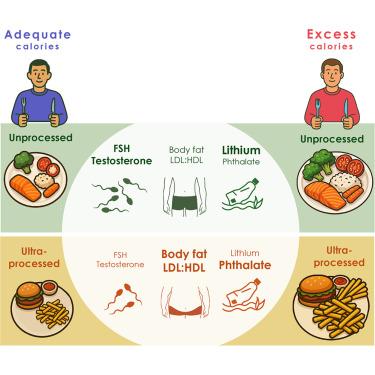
Why has the European Commission silently dumped its proposal for a mandatory food label (article by EuroNews)? The answer may lie in this Trustworthy Document that the CosmoPolitical Cooperative has translated in 7 languages and shared here Cell Metabolism (2025) "Effect of ultra-processed food consumption on male reproductive and metabolic health" (original language: English), and whose results are graphically summarised on the left.
Summary of the main ideas and results
The study compares 4 random samples of men of reproductive age, who were submitted to different diets during three weeks:
Unprocessed food, adequate calory intake;
Unprocessed food, excessive calory intake;
Ultra-processed food, adequate calory intake;
Ultra-processed food, excessive calory intake;
"Ultra-processed food" is defined by the NOVA classification as its Category 4: "Ultra-processed foods, such as soft drinks, sweet or savoury packaged snacks, reconstituted meat products and pre-prepared frozen dishes, are not modified foods but formulations made mostly or entirely from substances derived from foods and additives, with little if any intact Group 1 food (i.e. Unprocessed or minimally processed foods)". Concretely, "Ultra-processed food" can be recognised because its list of ingredients contain products that are not found in a typical household kitchen, such a preservatives, emulsifiers, sweeteners, glucose or fructose syrup, hydrogenated fats, etc.
The health of the men taking Ultra-processed food deteriorated (according to a number of indicators from analysis of their blood and semen samples), and their weight increased, even if the calory intake was adequate.
The health of the men taking unprocessed food was not altered, and they lost weight, even if their calory intake was excessive.
What did we find interesting in this document?
Ultra-processed food is not anecdotal: it represents the majority of calory intake in the Anglo-Saxon world (UK, US, Canada, Australia), and that trend is folllowed in the rest of the world. It generates considerable profits for the agro-food industry because it enables:
the cheap preservation of food;
the generation of food that is pleasant and easy to eat, even with low-quality (and hence low-cost) ingredients.
This study establishes rigorously that the main issue regarding the health effects of food is whether the food is ultra-processed or not. If food remains processed according to traditional means, then health is preserved and excess calories seem to have limited effects. It confirms a meta-study of 2024 reviewing a broad range of scientific literature going in the same direction.
It also explains why the food processing industry supports so much misleading and opaque indicators of food dietary features, such as the Nutriscore: it diverts the attention from the real problem, namely the ultra-transformation that is at the core of their business model.
This may be the reason why the European Commission silently dropped its plan for a mandatory nutrition label (and is sued for this): the only scientifically proven one, which provides directly usable, and easily understandable, information to the consumer very likely is a red flag on ultra-processed food. This runs directly against the interests of the agri-food lobby, which is probably violently opposing such a move, even if behind closed doors.
